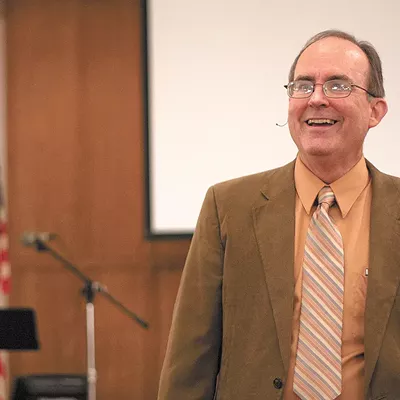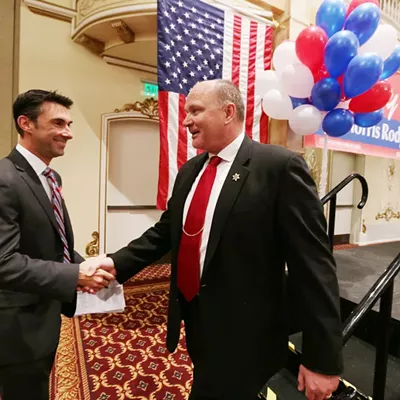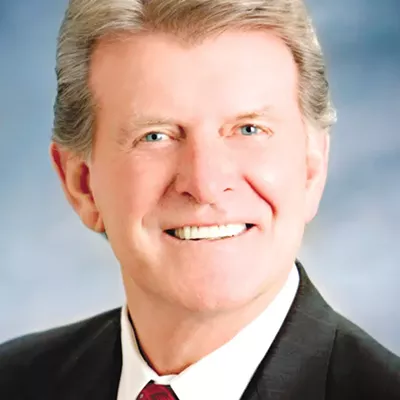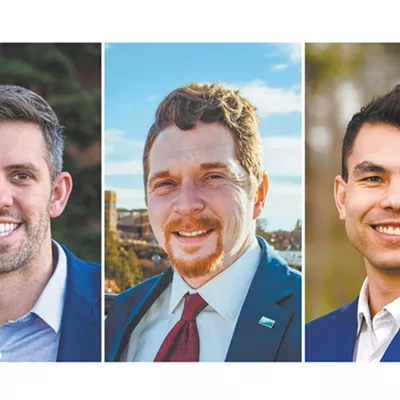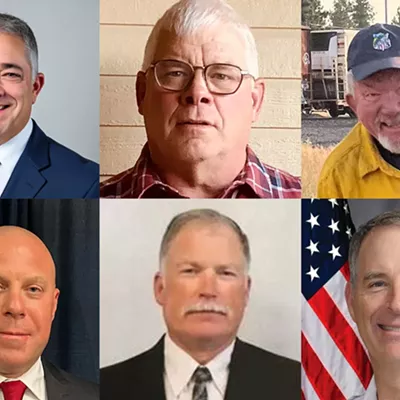Four years ago, when Republican Sen. Michael Baumgartner handily defeated Democratic incumbent Chris Marr for his seat in the state Senate, it was the most expensive legislative race in state history — and one of the ugliest.
As campaign contributions surpassed more than $1 million, Baumgartner and Marr didn't hold back from taking swipes at each other in hopes of capturing one of the few swing districts in the state. In an editorial, the Spokesman-Review called their behavior "juvenile" before endorsing Marr.
The 6th District Senate race isn't quite as contentious this year, but it's still among this campaign season's most costly legislative battles as Democrats and Republicans vie for control of the upper chamber. Seeking his second term, Baumgartner faces Democratic challenger Rich Cowan, CEO of North by Northwest Productions, a film studio in downtown Spokane.
While Democrats have held a comfortable majority in the state House of Representatives for more than a decade, control of the Senate shifted two years ago when Democratic Sens. Rodney Tom and Tim Sheldon defected from their party and caucused with Republicans. The winner of the 6th District, which includes Airway Heights, Medical Lake, Cheney and eastern and south Spokane, may determine which party sets the Senate agenda next session.
"This race has the power to shift the balance in favor of progress," says Sen. Andy Billig, D-Spokane. "Under the Republican-led majority last year, there was gridlock. There was no transportation package to pay for the North Spokane Corridor. There was no progress on women's reproductive rights and there was no capital or jobs budget."
"Do you want the Senate led by a bipartisan Eastern Washington-led coalition to check and moderate the very liberal downtown Seattle crowd that runs the House and a very liberal governor?" Baumgartner asks. "The big difference is whether you're going to reform government or pass tax increases."
The candidates are running on similar platforms: They both want to spur economic development in Eastern Washington, fund the completion of the North Spokane Corridor and prioritize education spending in the budget. The big difference is Cowan wants to raise revenue by re-examining and closing any unnecessary tax loopholes. Baumgartner would rather find ways to consolidate and reform state government to find savings in the budget.
A Pullman native, Baumgartner, 38, worked abroad as an economic development officer and U.S. diplomat in the Middle East after finishing grad school at Harvard. Among his accomplishments in his first term in the legislature, Baumgartner notes his work securing funding for Washington State University's Riverpoint campus and bringing all-day kindergarten to Spokane. He also spearheaded the effort to stop tuition hikes at state colleges for the first time in almost 30 years.
"He was clearly the leader in freezing tuition for our universities and community colleges for the last two years," says Sen. Mark Schoesler, R-Ritzville, leader of the Senate Republicans. "Without a doubt, he was the force within the majority that brought us to that remarkable accomplishment."
Described as "passionate" and "intense" by Schoesler, Baumgartner isn't afraid of ruffling a few feathers or voicing controversial opinions. After the machinists union rejected a contract to build Boeing's new 777X jet in Washington last year, Baumgartner called on Gov. Jay Inslee to convene a special session so legislators could make Washington a right-to-work state. Earlier this year, he introduced a bill mocking the state Supreme Court, which he's accused of judicial overreach for its role enforcing the McCleary education-funding decision.
Running as a moderate, Cowan, 58, entered his first political race in 2012, running unsuccessfully for the 5th District congressional seat held by Rep. Cathy McMorris Rodgers. At the same time, Baumgartner launched his failed U.S. Senate bid against Sen. Maria Cantwell.
On the campaign trail, Cowan frequently touts his experience as a "job creator" — a difference he's eager to point out between himself and his opponent. If you saw any zombies roaming downtown around Madison Street this summer, you can thank Cowan, whose production company started shooting the Syfy network TV series Z Nation, a post-apocalyptic zombie thriller, in May. He says the series, which has been picked up for a second season, created 200 local jobs and employed 1,300 extras.
"He's never signed a paycheck here. He's never run a business. He doesn't have a background where you have to get the job done," Cowan says of Baumgartner. "I've negotiated with labor unions and clients with the common goal of getting the job done and bringing jobs here to Spokane."
Less than two weeks out from Election Day, Cowan has a lot of ground to make up if he's going to beat Baumgartner at the polls. Cowan finished 14 percentage points behind Baumgartner in the August primary, with 43 percent of the vote to his opponent's 57 percent. Baumgartner also has a significant fundraising edge over Cowan, pulling in nearly half a million dollars to Cowan's $216,000. ♦
Candidate Q&A
If elected, what will you work to accomplish in the Legislature next session?
Michael Baumgartner (Republican): Protecting college students and fighting for low tuition, continuing to build the [Washington State University] medical school and fighting for a bipartisan, balanced budget would be the top three.
Rich Cowan (Democrat): First of all, get a transportation package passed and signed by the governor. ...Fully funding education so that every young person has a pathway to success. Right now we’re 47th in class size. That’s a huge indicator of academic success and graduation rates and that’s a big deal.
The Legislature is obligated under the state Supreme Court to fully fund K-12 education by 2018. How can the Legislature keep good on this promise while facing a projected budget shortfall? Would you support any plans for increasing the state’s revenue?
Baumgartner (R): The state is going to have record amount of revenue next year. What we've done in the Majority Coalition Caucus under my budget — where in the last 10 years non-education spending has grown at more than twice the rate of education spending — we reversed that trend. We grew K-12 education about 10 percent and we grew higher education 12 percent in last year’s budget. All areas of government grew three percent last year. We’re going to continue to prioritize education regardless of whether the Supreme Court tells us to or not. One of the ways that we can meet that McCleary obligation is to just put two-thirds of all new revenue growth into education and we’ll continue to meet that McCleary spending level. But McCleary is based on a flawed premise. It’s based on a flawed definition of basic education. ...We need to expand the definition of basic education to include both pre-k and higher education.
Cowan (D): You’re going to have to have some increases in revenue, but it has to be done in a very, very efficient manner. There are over 600 tax loopholes out there — and most of them are fine and should be there to attract business. They’re there for reason. Not having a sales tax for food – I don’t think there’s any talk about changing that, but there are some that need to be looked at. I think all of them should have some sunset provision so the Legislature studies them on a periodic basis. ... ‘Is this adding net positive economic benefit to the state and jobs?’ If it’s not doing that, then it should be cut. That should be the threshold for all these tax loopholes.
Without additional sources of revenue, state agencies will be forced to cut funding to balance the 2015 - 2017 budget. In your opinion, which programs and services can afford these budget reductions? On the other hand, which programs and services would you strive to protect from these cuts?
Baumgartner (R): We think there’s up to a billion dollars in back office IT operations that could be privatized out, contracted out to private entities. What we want to do is not contract out for the sake of contracting out, but if we can save money on non-essential services, them we could have more money for the social safety net and really truly caring for the most needy. so we need to continue to fight to do that.
Cowan (D): First off, education. That needs to be protected from any kind of cuts. We have to add to that. We’re below the national average in what we spend. ...I think we’re looking at more of [using] a scalpel than a huge chopping block. It’s matter of going through the budget, which is about two inches thick, and finding those savings.
Would you support Gov. Inslee’s proposed carbon emissions tax and/or cap-and-trade system? If not, what, if anything, should Washington do to cut greenhouse gas emissions in order meet the carbon-emissions reduction targets set by the Legislature in 2008?
Baumgartner (R): I think Gov. Inslee’s plan would be every expensive for for the state of Washington without much gain if you don’t address carbon emission in China or India, then what Washington state would do on its own would have very little impact. it’s a good thing to have more clean air. I supported shutting down the state’s only coal-powered emission plant in 2011. What we need to do is continue to harness our hydropower here in the state of Washington. It’s very, very clean and emission-free.
Cowan (D): We certainly have to take a hard look at the long-term preservation of our God-given infrastructure. Gov. Inslee — that’s a passion project for him and I think that's great. I’d like to continue to study it a little bit more and make sure it’s not affecting jobs in the long run. What’s really interesting, if we don't preserve our environment long-term, we won't be having a conversation about jobs in 50 years if we don't have an environment that’s conducive to economic activity.
As Washington faces a looming doctor shortage, Washington State University is asking the Legislature for $2.5 million to establish its own medical school. Would you support this request from WSU? If not, what’s your plan for filling this growing need in our health care industry?
Baumgartner (R): Yes. So I’ve been very, very involved with this issue and probably spent more time on the medical school than another other issue and continue to do so. I’m very excited by the WSU proposal. I think having more choice and competition will lead to more innovation and better services and research for the consumers.
Cowan (D): Absolutely. I’ve come out in favor publically for a WSU medical school headquartered in Spokane. It’s very important that we have a medical school headquartered here. We do have a looming shortage of physicians particularly in the primary care fields and that is the mission of WSU, educating our young people in those specialities.
As the recreational marijuana industry continues to grow, what reforms would you support to the medical and/or recreational markets?
Baumgartner (R): With the voters in the state of Washington choosing to do this, what we want to be able to see is a transparent market that crowds out the black market and the criminal element. You want to be able to track production to the point of sale. ...We want to make sure that we’re tracking the health costs and putting in place a system so if we see an increase in teens using marijuana and other things, we have some corrective action we can take.
Cowan (D): I think one the things that is very important is, we got to come up with a better mechanism for people in that industry to bank. Right now, it’s sort of cash kind of thing. Honestly there's a safety issue dealing with so much cash.
After accepting $8.7 billion in tax breaks, Boeing recently announced it will move 2,000 jobs to Oklahoma City and St. Louis. What incentives should Washington offer to big businesses to keep them from moving jobs out of state?
Baumgartner (R): We need to give ourselves a more competitive business environment. In the past, amidst the Boeing discussion, you’ll notice almost all of these Boeing jobs are going to right-to-work states. ...We should discuss Washington state becoming a right-to-work state.
Cowan (D): We need to have business incentives. The thing about running a business is, you just basically want a level playing field. When you have all these other states and countries offering incentives, you have to be on a level playing field. ...It’s always about long-term thinking with this, but you have to be attractive to business because that’s where jobs come from.
Here at the Inlander, we’ve written extensively about the cracks in our mental health system. Our stories have touched on the burden of mental illness on the criminal justice system, punitive conditions at Eastern State Hospital, psychiatric boarding, and the difficulty of getting care in rural areas. What specific steps would you support to improve mental health care in Washington?
Baumgartner (R): I think the main thing we need to do is focus on is seeing our county jails as an extension of the state’s mental health system because a lot of mentally ill end up in these jails and aren't cared for properly. ...Policies like mental health and child welfare, it’s one of the things where you as a legislator have to take advice from subject matter experts, staff and testimony. At least I certainly do on those issues.
Cowan (D): A society is only as strong as it treats its most vulnerable and we’re better than this as a state, as a society, as a community. These are our neighbors — loved ones — and we need to do all we can do to help and support and really empower people in the system. ...It’s making these upfront investments that will payoff in the long run and it’s the right thing to do.






